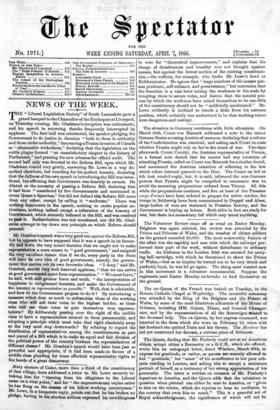Mr. Goschen's speech was a very good one against the
Reform Bill, but he appears to have supposed that it was a speech in its favour. He hitt down the very sound doctrine that we ought not to make represehtation a mere means to "good government," and assigned the very excellent reason that if we do, every party in the State will have its own idea of good government, namely, the govern- ment that carries out its own favourite ideas. "I deny," said Mr. Goschen, amidst very well deserved applause, "that we can arrive at good governmeht apart from representation." "We must leave," he said, with still greater force and truth, "the interpretation of happiness to enlightened theorists, and make the Government of the country as representative as possible." Well, that is admirable, and how do the Government propose to do it ? By introducing a measure which does as much to enfranchise those of the working class who will sell their votes to the highest bidder, as those who will use their votes to gain themselves true represen- tatives? By deliberately passing over the right of the middle class to have a representation secured to them permanently, and adopting a principle which must take that right absolutely away at the very next step downwards? By refusing to regard the distribution of representatives among the constituencies as part and parcel of a Bill which is to make an equal and fair division of the political power of the country between the representatives of different classes? Mr. Goschen's speech would have been just as powerful and appropriate, if it had been made in favour of a middle class pleading for some effectual representative rights at the hands of a great democracy.






























